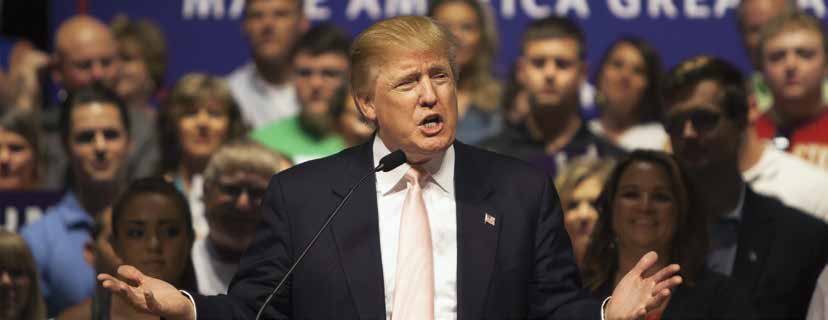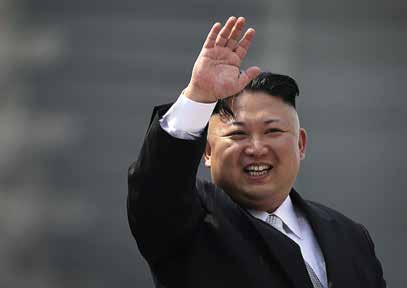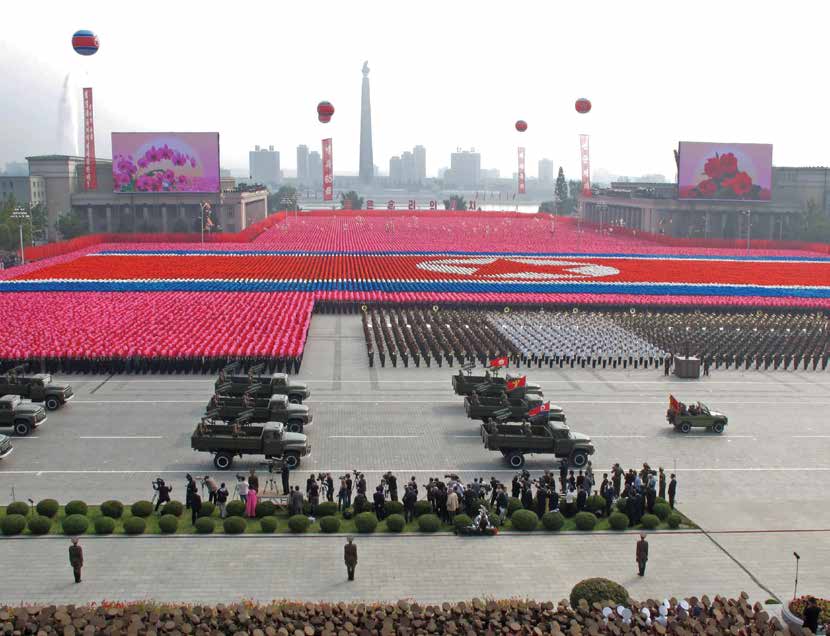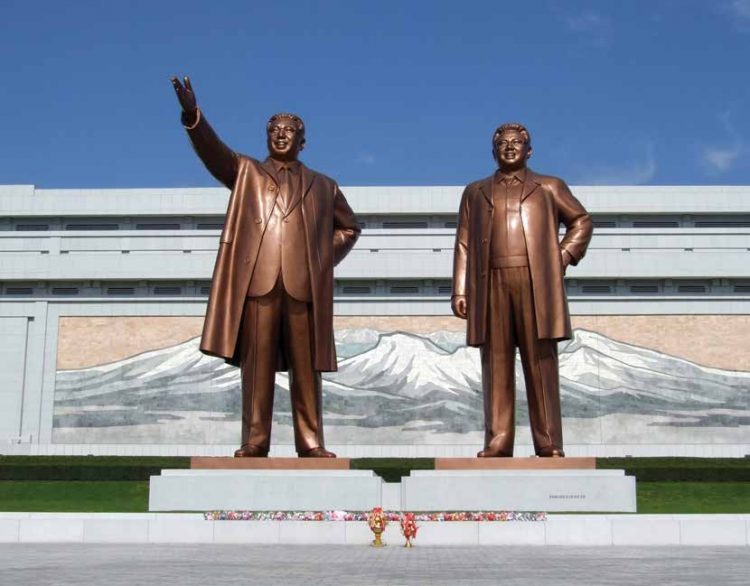Professor, author and financial advisor, Dr Peter T Treadway is currently principal of Historical Analytics LLC, a consulting firm with an investment approach based on his Wall Street experience as economist, strategist and securities analyst.
Dr Peter T Treadway examines the basis of long-standing tensions between North Korea and the US – something that will affect stock markets around the world.
This column is usually written from the perspective of technology, globalization and the stock markets. Let me say this about that. The world’s stock markets won’t be going up if there is a war in the Korean Peninsula. Some people may regard North Korea and its unpredictable leader as unsolvable problems. They are not. It may be a good thing that Donald Trump, would-be warrior and deal maker that he seems to be, is the American President. Trump, if he could just spend a little time understanding America’s role in Korean history since 1945, could make a deal with Kim Jong-un and push North Korea off the front pages.
So Mr President, where’s Kim Jong-un’s Hamburger?
In his campaign for President, Donald Trump explicitly stated that he was prepared to sit down and have a hamburger with Kim Jong-un, the current ruler of the Democratic People’s Republic of Korea, aka North Korea. Trump the Campaigner bragged how he was master of the art of the deal. By implication, he didn’t suffer from the inhibitions of the George W Bush or Barack Obama Administrations, which avoided direct meetings with North Korea. Trump the Campaigner seemed to instinctively know that a military solution was not the preferred way to deal with the North Korean missile/nuke program.
In my opinion, the Campaigner was 100% right on the Korean question. The North Korean problem does not have an acceptable military solution and sanctions, so far anyway, have not worked. This is a hostage situation where the Korean people – North and South – as well as the 30,000 American troops stationed in South Korea, are the hostages. Seoul, South Korea’s capital and major city, is only 30 miles from the North Korean border. The US cannot call Kim’s bluff that if attacked he would unleash massive destruction on South Korea. It would be largely Koreans who did the dying if the US was wrong and Kim carried out his threat.
North Korea has had over 60 years to prepare for a possible American attack. Given North Korea’s history and the US propensity for intervening in local conflicts, a US attack is a realistic worry. North Korea has buried its missiles and nukes underground. The country is an armed garrison.
North Korea has a totally inefficient socialist/communist economic system that saw its people starve in the 1990s. It is a country where human rights are ignored and it is isolated from the global economy. In spite of all this, if not stopped North Korea will be capable within a few years of hitting the US with nuclear missiles.

Incidentally, this would be a technical achievement given all the obstacles North Korea faces and is the product of a population that is intelligent and industrious. These are the same Korean people who under the superior capitalist/democratic system in the south have built companies like Samsung and Hyundai. The same Confucian work ethic pervades North and South Korea as it does all East Asia. Building missiles and nukes doesn’t require imagination, innovation or political freedom. Rather it is a matter of technical discipline and competence and implementation of known technologies. The North Koreans can do it.
A Good Deal Is One Where Both Sides Are Happy
The US and the world want the North Korean government to cease and desist with its missile/nuclear bomb program. That’s a given.
But it seems nobody ever asks what do the North Koreans and specifically Kim Jong-un want? Trump must try to understand what that is. In my opinion, the North Koreans are not building their missiles and nukes to attack their neighbors or the US. What they want most of all – more than even reunification of the Korean nation – is security from American attack and recognition by the United States. So why not give them this?
To be fair, you cannot blame the North Koreans for their fear of the United States. The North Korean experience with the United States has not been a happy one. For starters, in 1945 it was the Americans and the Russians that arbitrarily divided Korea in two (it was supposed to be temporary). Prior to that, Korea as a unified entity had existed for at least 1,500 years.
During what started out as a civil war, in 1950 the US intervened on the non-Communist side. Bombers directed by General Curtis Lemay pounded all of Korea. The toll on the North was especially horrific. An estimated two to three million civilians died as the bombs and the napalm rained down. Reservoirs, civilians, fishing boats – everything was targeted. And of course the senior American general, Douglas MacArthur, wanted to use nuclear weapons when the Chinese entered the conflict. Yes, President Truman fired MacArthur, but that might have been cold comfort to the North Koreans. Some other US president might make a different decision.
The Korean War ended not with a peace treaty but with an armistice agreed in 1953. In theory, the parties are still at war. The armistice had a section forbidding the introduction of nuclear weapons to the Korean Peninsula. But in 1956 the United States unilaterally abrogated this section of agreement.

Over the years the US has flip-flopped, sometimes supporting dialogue with North Korea and sometimes supporting isolation. An argument can be made that dialogue did produce positive results. But in 2001, the new Administration of George W Bush put North Korea back in the isolation booth and declared the country to be part of the “Axis of Evil”. After Iraq, regime change was supposed to come to Iran and then North Korea. That was the Bush/neocon plan and unfortunately it turned out to be the Bush/neocon nightmare. Partly as a result of being put back in the isolation box, the North Koreans resumed their missile/nuclear weapons program.
Kim Jong-un must be aware that in Libya, Muammar Gaddafi – at US urging – gave up his weapons of mass destruction and then, as a “reward” for good behavior, was driven out of office by a coalition of the US and European countries. Gaddafi suffered a horrible death by colonoscopy by bayonet. Kim must be aware that the US invaded Iraq and turned the Middle East upside down, with Iraq and Syria in shambles and literally millions winding up refugees or dead. The interesting thing is that Donald Trump the Campaigner, who criticized prior American interventions in Iraq and Libya, had a skeptical view of these events that Kim Jong-un might be comfortable with.
The US can make a deal with North Korea. The United States must define what its objectives are in any negotiation. In my opinion the only American objective should be to convince North Korea to give up its missile/nuclear weapons program. This will require – to use Trumpian language – an amazing verification program and no doubt Chinese participation.
Regime change should not be an American objective. Kim Jong-un may be a ruthless butcher, he may be a “crazy fat kid” as Senator McCain is reported to have said, he may qualify for all the negative adjectives American politicians hurl at him (like they used to hurl at Saddam Hussein). But he isn’t stupid and he is not going to negotiate his own demise. And he is the guy running North Korea. North Korea has been prophesized to collapse for years but somehow it hasn’t happened.
Enough with traditional American moral masturbation and wishful thinking. Mr President, let’s make a deal.

What About a Missile Defense System?
Depending on the reliability of any verification scheme negotiated, one option for the US that could accompany or substitute for any agreement would be to build an anti-missile system to defend against North Korean missiles. In fact, anti-ballistic THAAD (Terminal High Altitude Area Defense) missiles are being installed in South Korea reportedly on a rushed basis. According to some reports, it is unlikely this system would be 100% reliable against North Korean missiles. In any case they would not be useful in protecting the United States against North Korean intercontinental ballistic missiles. This system is a very poor Plan B in the absence of an agreement with North Korea.
The Chinese are opposed to the THAAD system since they think it would be utilized for spying against them. To some extent it is up to the Chinese to come up with a verification system which would make a THAAD defense system unnecessary. “Minor” detail: The Chinese have a mutual defense treaty with North Korea that was signed in 1961 and has been extended to 2021.
Another complication: The THAAD system is being based on South Korean soil. Not all South Koreans are enthused about this. China has already imposed informal but significant economic sanctions against South Korea in response to the THAAD deployment. And people living near the THAAD missiles worry that they would become targets in the event of North Korean retaliation.
It should be noted that as this goes to press, South Korea only had an acting president. This will change soon with elections being held on 7 May. South Korean and American interests do not always coincide. Installation of the THAAD system is one contentious issue.
Isolation Nurtures Dictators
In my opinion integration into the global economy is the most potent way to achieve regime change and the ultimate removal of dictators. So often the US has attempted to punish dictators by forcing their countries into isolation. But isolation strengthens dictators, global integration weakens them.
The best example of this was the fall of the Soviet empire. The people of the so-called East bloc and the Russians themselves saw how their Western European cousins were living and what they were missing. A similar story can be told for China where enough Chinese people had gone abroad and the urban Chinese population knew they were unnecessarily poor. The country was ripe for the reforms of Deng Xiaoping. Cuba on the other hand has been under US embargo and isolation since 1959. Castro remained in power.
For those who care about such things, a prerequisite for regime change in North Korea is less, not more, isolation. Ironically, in as much as they help keep his people in ignorance of the outside world, more sanctions which isolate North Korea might make Kim Jong-un happy. So long as the North Korean people live in ignorance of the rest of the world and how much their society is behind, they will remain quiescent.




























